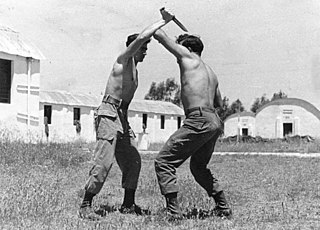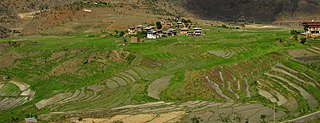
Krav Maga is a military self-defence and fighting system developed for the Israel Defense Forces (IDF) and Israeli security forces derived from a combination of techniques sourced from boxing, wrestling, aikido, judo and karate, along with realistic fight training.

Organic certification is a certification process for producers of organic food and other organic agricultural products. In general, any business directly involved in food production can be certified, including seed suppliers, farmers, food processors, retailers and restaurants. A lesser known counterpart is certification for organic textiles that includes certification of textile products made from organically grown fibres.
The Living Soil (1943) by Lady Eve Balfour is considered a seminal classic in organic agriculture and the organic movement. The book is based on the initial findings of the first three years of the Haughley Experiment, the first formal, side-by-side farm trial to compare organic and chemical-based farming, started in 1939 by Balfour, on two adjoining farms in Haughley Green, Suffolk, England.
The Haughley Experiment was the first comparison of organic farming and conventional chemical-based farming, started in 1939 by Lady Eve Balfour and Alice Debenham, on two adjoining farms in Haughley Green, Suffolk, England. It was based on an idea that farmers were over-reliant on fertilizers, that livestock, crops and the soil should be treated as a whole system, and that "natural" farming produced food which was in some way more wholesome than food produced with more intensive methods. Lady Balfour believed that mankind's future and human health were dependent on how the soil was treated, and ran the experiment to generate scientific data that would support these beliefs.
The International Federation of Organic Agriculture Movements is the worldwide umbrella organization for the organic agriculture movement, which represents close to 800 affiliates in 117 countries.

Rodale, Inc. was an American publisher of health and wellness magazines, books, and digital properties. Rodale was headquartered in Emmaus, Pennsylvania and maintains a satellite office in New York City. It publishes health and wellness lifestyle magazines, including Men's Health and Prevention. The company has published a collection of bestsellers, including An Inconvenient Truth and Eat This, Not That.

The European Union regulation (EEC) No. 2092/91 of the European Council of 24 June 1991 on organic production of agricultural products and indications referring thereto on agricultural products and foodstuffs (EU-Eco-regulation) defines how agricultural products and foods that are designated as ecological products have to be grown. The regulation is derived from the guidelines of the International Federation of Organic Agriculture Movements (IFOAM), which is an association of about 800 member organizations in 119 countries.

Small-scale agriculture has been practiced ever since the Neolithic Revolution. More recently it is an alternative to factory farming or more broadly, intensive agriculture or unsustainable farming methods that are prevalent in primarily first world countries. Environmental Health Perspectives has noted that "Sustainable agriculture is not merely a package of prescribed methods. More important, it is a change in mind set whereby agriculture acknowledges its dependence on a finite natural resource base--including the finite quality of fossil fuel energy that is now a critical component of conventional farming systems."
The Principles of Organic Agriculture were established by the International Federation of Organic Agriculture Movements (IFOAM) in September, 2005. They are aspirations for organic farming. The Principles were approved by the General Assembly of IFOAM on September 25, 2005.
KRAV-FM, is a commercial FM radio station in Tulsa, Oklahoma, owned by Cox Radio. It airs a hot adult contemporary radio format, playing a mix of pop hits from the 1990s to today. Its studios and offices are located in the Cox Broadcasting Complex on South Memorial Drive, near Interstate 44 in Tulsa. The transmitter is on Route 97 in the Osage Reservation north of Sand Springs. Mix 96.5 is also heard on Cox Digital Cable channel 1984.

Agriculture in Bhutan has a dominant role in the Bhutan's economy. In 2000, agriculture accounted for 35.9% of GDP of the nation. The share of the agricultural sector in GDP declined from approximately 55% in 1985 to 33% in 2003. Despite this, agriculture remains the primary source of livelihood for the majority of the population.
Organic wild refers to organic agriculture products which are collected from wild land. As of 2005, organic wild products are farmed on approximately 62 million hectares. According to the International Federation of Organic Agricultural Movements 36% of these were bamboo shoots, 21% were fruits and berries, and 19% were nuts. The first IFOAM conference on organic wild products was held in May 2006.

Organic farming is practiced around the globe, but the markets for sale are strongest in North America and Europe, while the greatest dedicated area is accounted for by Australia, the greatest number of producers are in India, and the Falkland Islands record the highest share of agricultural land dedicated to organic production.
Robert David "Bob" Rodale was an American adherent of organic farming, regenerative agriculture, and gardening and a publisher focused on health and wellness lifestyle magazines and books. Rodale was the founder of the Lehigh Valley Velodrome.
Organic farming practices in New Zealand date from 1930 but began on a commercial scale in the 1980s and is now an increasing segment of the market with some of the larger companies such as Wattie's becoming involved.
Participatory Guarantee Systems (PGS), as defined by IFOAM, are "locally focused quality assurance systems. They certify producers based on active participation of stakeholders and are built on a foundation of trust, social networks and knowledge exchange." They represent an alternative to third party certification, especially adapted to local markets and short supply chains. They can also complement third party certification with a private label that brings additional guarantees and transparency. PGS enable the direct participation of producers, consumers and other stakeholders in:
Organic aquaculture is a holistic method for farming marine species in line with organic principles. The ideals of this practice established sustainable marine environments with consideration for naturally occurring ecosystems, use of pesticides, and the treatment of aquatic life. Managing aquaculture organically has become more popular since consumers are concerned about the harmful impacts of aquaculture on themselves and the environment.

The National Association for Sustainable Agriculture, Australia (NASAA) is an Australian and international organic certifying agency and trade association, located in Stirling, South Australia.
Asia Regional Organic Standard (AROS) is a common regional standard for organic production in East, South-East and South Asia. AROS results from a process intended to harmonize existing organic standards in that region and to promote new ones. It was launched by the Global Organic Market Access (GOMA) project, sponsored by Food and Agriculture Organization of the United Nations (FAO), International Federation of Organic Agriculture Movements (IFOAM), and United Nations Conference on Trade and Development (UNCTAD).








